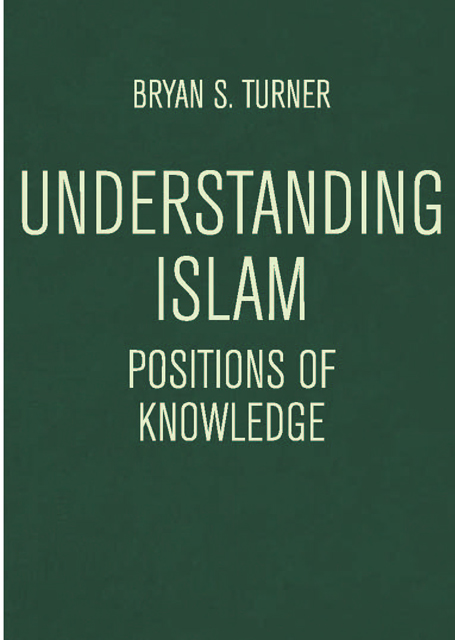Book contents
- Frontmatter
- Contents
- Acknowledgements
- Introduction: What is Understanding?
- 1 The Changing World of Islam
- 2 Insiders and Outsiders
- 3 The Rise of the Sociology of Islam
- 4 Postmodernism, Globalisation and Religion
- 5 Orientalism and Islam
- 6 Islamophobia
- 7 Feminism, Fertility and Piety
- 8 The Problems of Positionality
- 9 The Possibility of Dialogue
- Index
3 - The Rise of the Sociology of Islam
Published online by Cambridge University Press: 13 April 2023
- Frontmatter
- Contents
- Acknowledgements
- Introduction: What is Understanding?
- 1 The Changing World of Islam
- 2 Insiders and Outsiders
- 3 The Rise of the Sociology of Islam
- 4 Postmodernism, Globalisation and Religion
- 5 Orientalism and Islam
- 6 Islamophobia
- 7 Feminism, Fertility and Piety
- 8 The Problems of Positionality
- 9 The Possibility of Dialogue
- Index
Summary
Introduction: In the Beginning
There are good reasons for recognising Abd al-Rahman Ibn Khaldun (1332–1406) as the founding father of sociology. The Muqaddimah (Prolegomenon) of 1377 is the famous introduction to the history of the known world. The work, which can be read as a theory of the state and religious change, was, among other things, a study of the contrasted forms of social cohesion (asabiyyah) in the city and the desert. The Muqaddimah is the Introduction, but it also means the first premise of an argument. In this respect it indicates the rational basis of his historical analysis and the continuity of his work with Aristotle (Dale 2015; Mahdi 1957). His work anticipated Émile Durkheim (1858–1917), the great French sociologist who, probably adopting Ibn Khaldun, developed a contrast between organic and mechanical solidarity to grasp, in particular, the transformation of France in the nineteenth century from a predominantly rural to an urban society (Durkheim 1984). Whereas solidarity in traditional societies rested on sameness, locality and common practices, the solidarity of an industrial urban society depended on the division of labour in which there is functional interdependence between members of the society. Ibn Khaldun’s study of urban and tribal solidarity was also adopted by Ernest Gellner (1969) in his study of the Atlas Mountains. He recognised the obvious parallel between Ibn Khaldun and Durkheim (Gellner 1975, 1981, 1985). Gellner is probably more famous for his publications on nationalism than his work on Islam, although the two issues are closely related. For Gellner, the social solidarity of modern societies will depend more on an integrated national system of education (and thereby a common language) and nationalism as the dominant political idea. The relationship between nationalism and Islam has played an important role in political sociology as a framework for understanding state formation.
While recognising Ibn Khaldun as a legitimate sociologist avant la lettre, I am more concerned with Western rather than Muslim attitudes and approaches to understanding Islam. More specifically in approaching this topic as a sociologist, I am concerned to understand how (primarily Western) sociologists have approached Islam in the recent history of sociology.
- Type
- Chapter
- Information
- Understanding IslamPositions of Knowledge, pp. 52 - 75Publisher: Edinburgh University PressPrint publication year: 2023



